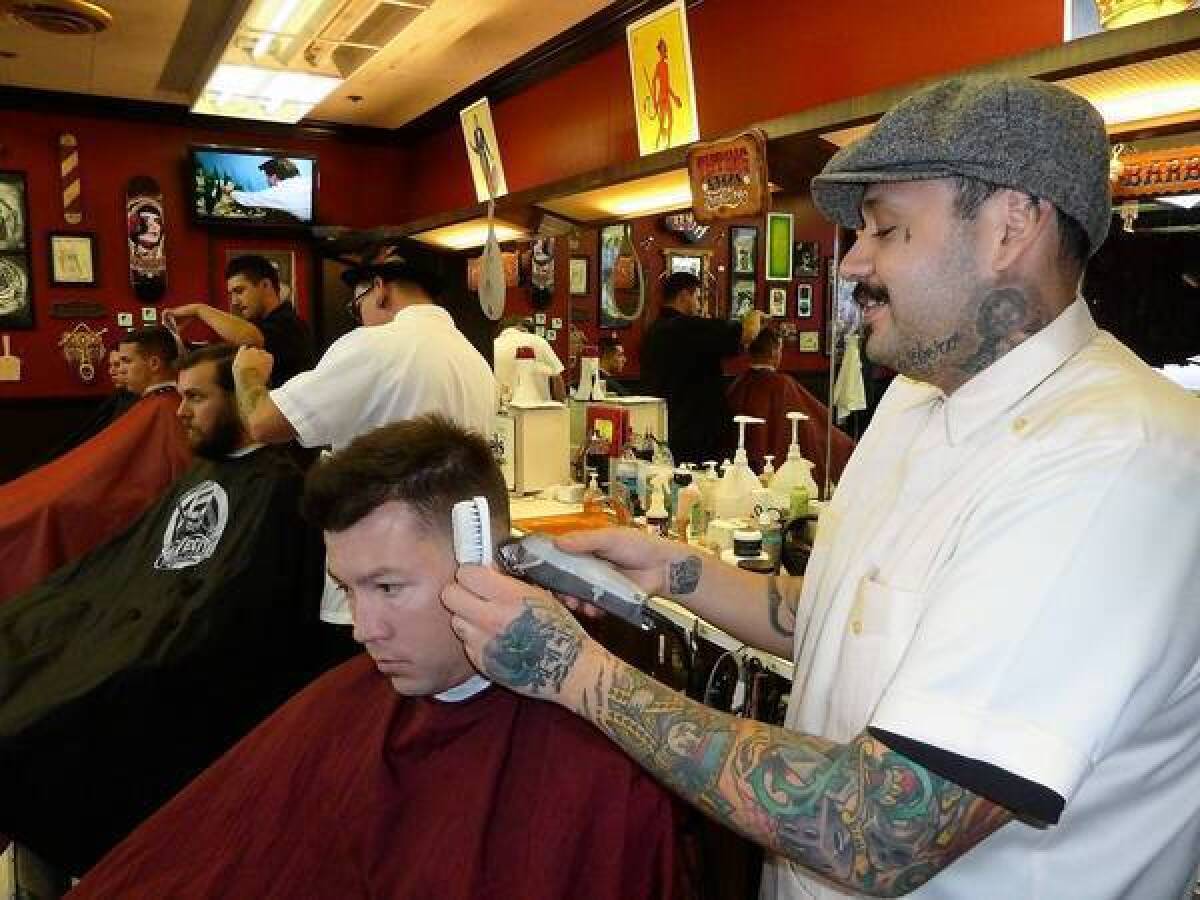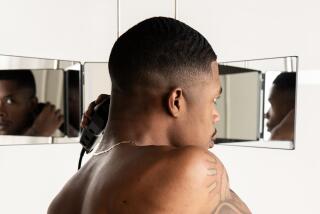Rockabilly barber revives old-school pompadour at Vegas shop

- Share via
LAS VEGAS — Comb and electric razor at the ready, Martin Corona stood over his customer, poised to create a version of his specialty retro-cool hairstyle.
The rockabilly cut.
“I’ll take the regular pomp,” the customer said. “High and tight on the sides.”
Corona nodded. He understood precisely what the man wanted, a cut still in demand even six decades after it made its debut among American youth.
The rockabilly look was spawned by the 1950s music that melded rock ‘n’ roll with bluegrass, with its twirling stand-up basses and twangy vocals. The music’s emerging subculture soon featured slick ski-jump-sloped pompadours (think early Elvis), tattoos and vintage cars known as “rat rods,” some with dangerous-looking shark fins and buffed black bodies.
But the hair has always been the thing: not just the heart-stopping pompadour but also extra-wide parts, comb-overs, the cut high in the back and on the sides.
“For years, you couldn’t go to a regular barbershop and get a pompadour — the old barbers wouldn’t know what it was,” said Corona, 28, who began styling rockabilly cuts in his Las Vegas garage as a teen. “They’d look at you like you were crazy, saying, ‘That’s not gonna be straight!’”
As rockabilly began enjoying a revival a decade ago, so too has the look that launched a thousand guitar riffs. Although Corona’s business didn’t make the cut, Men’s Health magazine recently featured several rockabilly shops in its list of “the manliest barbershops in America.”
Again in vogue, the country-musician look from another era has helped stem the decline of traditional barbershops in the U.S., Corona said. Now a new generation of haircutters offers old-school lather shaves with steamed towels, not to mention elaborate sculptured comb-outs not found at the average franchise hair salon.
“As the old-style barbers retired, the young rockabilly barbers helped keep the trade alive,” he said. But as Corona also pointed out about these new hair joints, “They’re definitely not your grandfather’s barbershop.”
Last year, since Corona opened his Hi-Rollers barbershop just east of the Strip near downtown Las Vegas, the razors have buzzed nonstop. Business has been so good, he just added a fourth cutting station.
“The chairs are always full. I guess people just like the look of that classic hairstyle,” said Mike Hellem, 23, a Clark County firefighter, one of those who prefer the sides of a “pomp,” as it’s called, “high and tight.”
The vibe is low-key cool: a man cave of black-and-white tile floors and red walls crowded with skateboards, guitars, pictures of vintage cars and cards for Loteria, a Mexican version of bingo. The magazine stand featured Playboy, Lowrider and other men’s fare for customers Corona says are mostly 18 and older.
“This isn’t any salon. It’s a place where people get their hair cut and hang out,” said Corey Siu, 34, lead guitarist in Corona’s rockabilly band. “I’ve gotten my hair cut and stayed for another five hours.”
Corona is a walking ad for the new generation of hipster haircutters: His arms, neck and face are covered with tattoos of his trade, including a tiny treble clef on his right cheekbone, a pair of shears on his left. The word “barbero,” Spanish for barber, spreads across his neck just beneath his chin. His left arm has the image of a straight razor with a handle styled like a barbershop pole.
Yet while his mustache is waxed at the tips, Corona’s pompadour is covered with a hat. “We comb hair all day long,” he said. “The last thing we want to do is comb our own hair.”
The shop’s name comes from Corona’s rockabilly band, Will and the Hi-Rollers. For years, the rhythm guitarist styled the hair of band mates who couldn’t find a place for a real pompadour treatment: He took them out back to the garage and developed his technique.
In 2009, Corona enrolled at a barber college but soon found the pompadour was nowhere in the textbook. So he called veteran cutters in California to tap their brains about the classic looks.
Last year, he saw a barbershop for sale online. Robert Esparza was selling his family’s traditional shop on a site that had featured a barbershop for 60 years. But what Corona liked most was the large parking lot, where he sponsors vintage car shows.
After the sale, Corona asked Esparza to stay on for a while and taught the 24-year-old how to do the rockabilly look. He taught him to show customers how to maintain their pompadours at home, using their own combs to full advantage, pitching such products as water-based pomade, an easy-to-wash-out gel.
On a recent weekday, Corona showed off cellphone pictures of various vintage looks. All four barber chairs were occupied, and half a dozen men waited their turn to pay $15 for a standard cut.
Although business booms, the area remains sketchy, with boozers ambling off a dreary section of the Strip. Two uniformed Las Vegas policemen recently walked into the shop, halting conversation as though the strings had suddenly been ripped from an electric guitar.
“We’re looking for somebody,” one cop announced. “Shaved head. Bunch of tattoos. Latino guy.”
One officer searched the back room as the other made small talk with Corona’s customers. Then, as suddenly as they came in, the cops were gone.
The rockabilly barber shook his head.
“Why would a bald guy even be inside a barbershop?” he said to agreement all around. “And if you’re looking for tattoos, take your pick. Everybody in here has tattoos.”
He sighed again.
“Next!”
More to Read
Sign up for Essential California
The most important California stories and recommendations in your inbox every morning.
You may occasionally receive promotional content from the Los Angeles Times.











